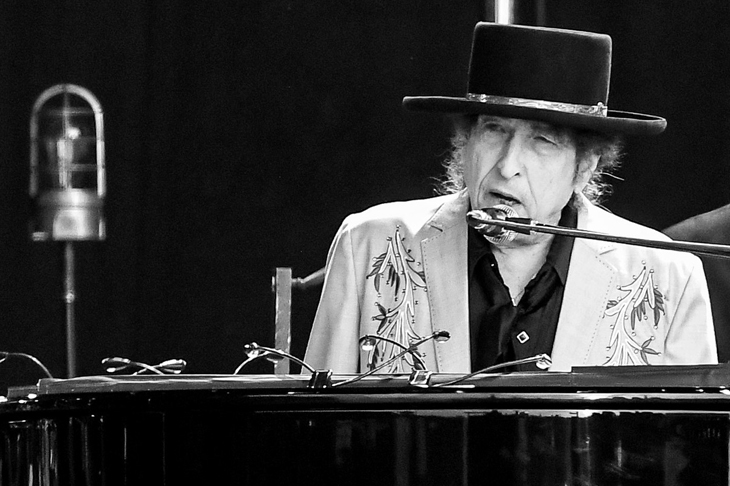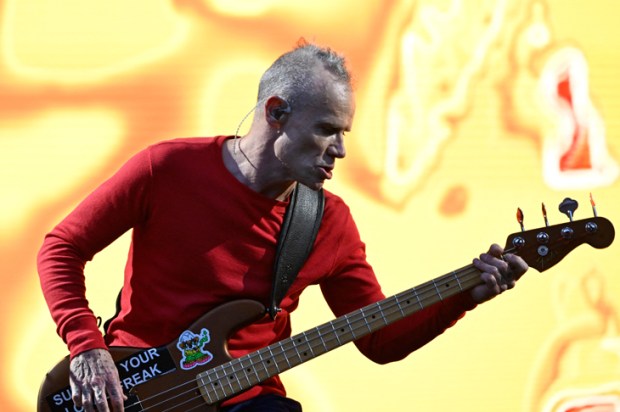As usual, Bob Dylan put it best. ‘I’m a religious person,’ he recently told the New York journalist Jeff Slate. ‘I read the scriptures a lot, meditate and pray, light candles in church. I believe in damnation and salvation, as well as predestination.’
In the interview, published just before Christmas in the Wall Street Journal, Dylan went on to name-check the liturgical works he most enjoys poking his nose into these days: the Californian scholar Robert Alter’s lyrical interpretation of the Five Books of Moses, the Pauline epistles from the New Testament, and Anglo-Catholic theologian Darwell Stone’s ground-breaking 1909 meditation, Invocations of Saints.
The old troubadour might have nominated some titles closer to the Year of Our Lord 2023. The past few weeks have seen new books by music stars riffing on religious themes not only by Dylan himself but the bloke from U2 with the blue-tinted sunglasses along with Warracknabeal’s most celebrated former choir boy, the Very Reverend Nick Cave.
These works are of varying quality. In publicly mining their old-time beliefs, though, each of them have unabashedly touched on what until recently has largely been a taboo nerve in rock.
Music stars are supposed to be edgy. Nothing could be less edgy, or so the thinking used to go, than homilies put to music or freelance sermonising on stage – or, worse, on the printed page.
Maybe it’s an age thing. Bono and Cave are in their sixties, and Dylan seems to have been around almost as long as the biblical stories he tells us he enjoys poring over. Religious meditations come more naturally with one’s autumn years. But I suspect something else is spurring these performers to flout rock and roll’s secular etiquette.
As the American linguist John McWhorter argues in his best-seller Woke Racism, what the wider culture is dealing with today is a pseudo-religion similar, albeit markedly inferior, to the old-time variety.
In the new theological order, McWhorter suggests, white guilt serves as the original sin, academic experts as a kind of pious ecclesiastical order and the dragooning and ritual public humiliations of perceived sinners simply a modern-day version of ex-communication. Apocalyptic environmental prognostications serves as a modern Book of Revelation, while the lost paradise of the Garden of Eden reappears as an idyllic pre-colonial state.
For all the outward similarities, though, the latest religion doesn’t seem to have many of the positive features of the system it’s looking to replace: no Chartres Cathedrals or Cistine Chapels, no Dostoevskys or Chestertons, and no Johann Sebastian Bach. Nor, it has to be said, much decent music to speak of.
It’s in this context that even the peppiest of Bono’s peppy religious bromides in his own work, Surrender: 40 Songs, One Story, doesn’t seem half bad.
‘If I was in a café right now, and someone said, “Stand up if you’re ready to give your life to Jesus,” I’d be the first to my feet,’ he exclaims at one point as he looks back over his superstar life and times. ‘I took Jesus with me everywhere and still do.’
Again and again he returns to these kinds of proclamations over the course of 557 pages – longer than the New Testament – but most of the time the effect is much less irritating as it once might have been as it is a timely reminder that woke isn’t the only devotional game in town.
Bono may sometimes be a little too annoying for his own good, but Faith, Hope and Carnage, a series of conversations between Nick Cave and the Irish journalist Sean O’Hagan, is the Melburnian rock star in prime theological form.
Ever since he first teamed up with the local son of a vicar, Mick Harvey, and formed The Birthday Party, Cave’s most urgent songs have always been freighted with religious talk and allusions. Even early albums such as The Good Son had him lifting passages verbatim from the King James Bible. Lately there have been other more personal considerations as well.
In the wake of his younger son Arthur’s death in 2015, and the death of another good son, Jethro, just last year, Cave now says he has become emphatically religious in the sense of feeling a newfound sense of ‘deep inclusion in the human predicament’.
For him, he says, ‘It feels to me as if the existence of God is a detail, or a technicality, so unbelievably rich are the benefits of a devotional life,’ he muses. ‘Stepping into a church, listening to religious thinkers, reading scripture, sitting in silence, meditating, praying – all these religious activities eased the way back into the world for me.’
And who would have thought, for instance, that his gorgeously jaunty song from 2004, ‘Breathless’, is not only a celebration of the gambolling lambs but what the artist now describes as ‘explicitly religious’, a veritably Christian ‘love song to God’?
Bob Dylan himself is Jewish, of course, give or take his own rough and rowdy conversion in the late Seventies to Christianity. He mines all of this richly in The Philosophy of the Modern Song, his beautifully illustrated tour of sixty-six titles he says have been a critical part of his own eighty-one-year odyssey aboard the holy slow train.
Dylan, a sage-like conductor, gives a little sermon on the hidden meaning of each of these compositions, whether Sinatra, Elvis Costello or Cher, before clipping the ticket and moving along.
As the writer Jeffrey Salkin points out, the Dylanesque method is ‘Jewish’ in shape, form and style. In riffing on secret meanings, Dylan is playing the ancient role of a sage, handling a potted sermon as if from a sacred text, turning it into one huge text.
The resultant work is a series of midrashim, ‘of sacred Jewish explorations and commentaries, on an older and far more elusive text: himself,’ Salkin writes. It also offers a particularly damn fine reading of ‘London Calling’ by the Clash.
What Dylan and the others are sharing, I think, is an excellent service to anyone who might feel put on, put off or put up by the Great Awokening.
Got something to add? Join the discussion and comment below.
Get 10 issues for just $10
Subscribe to The Spectator Australia today for the next 10 magazine issues, plus full online access, for just $10.
You might disagree with half of it, but you’ll enjoy reading all of it. Try your first month for free, then just $2 a week for the remainder of your first year.















Comments
Don't miss out
Join the conversation with other Spectator Australia readers. Subscribe to leave a comment.
SUBSCRIBEAlready a subscriber? Log in